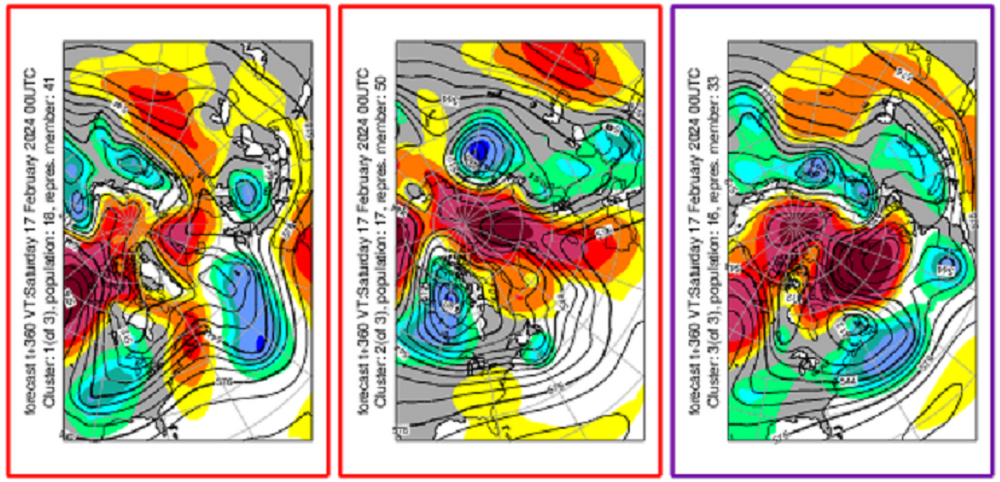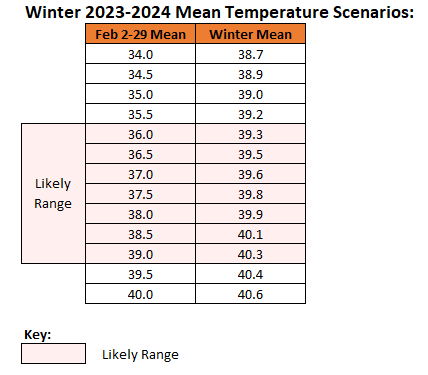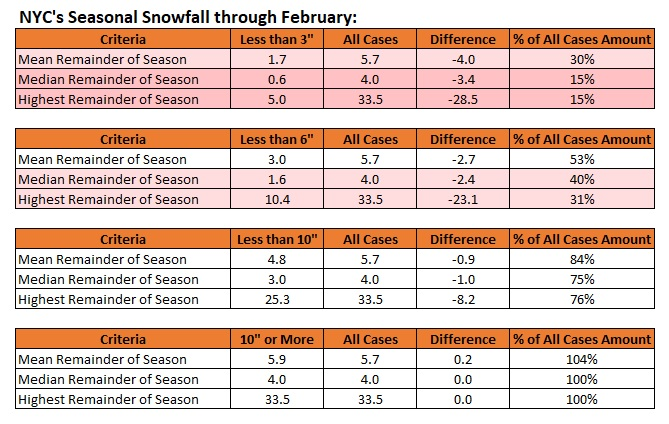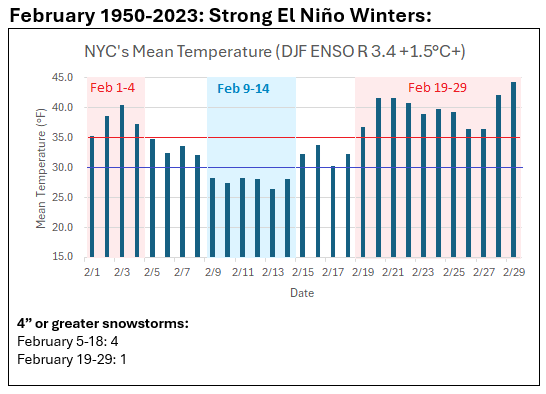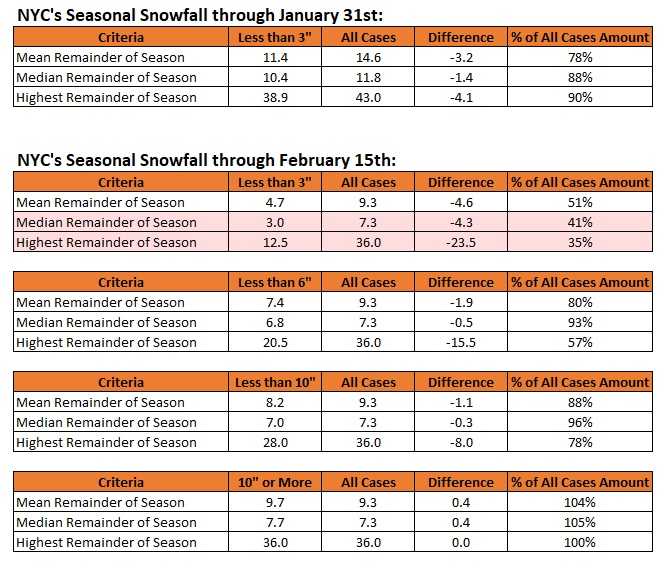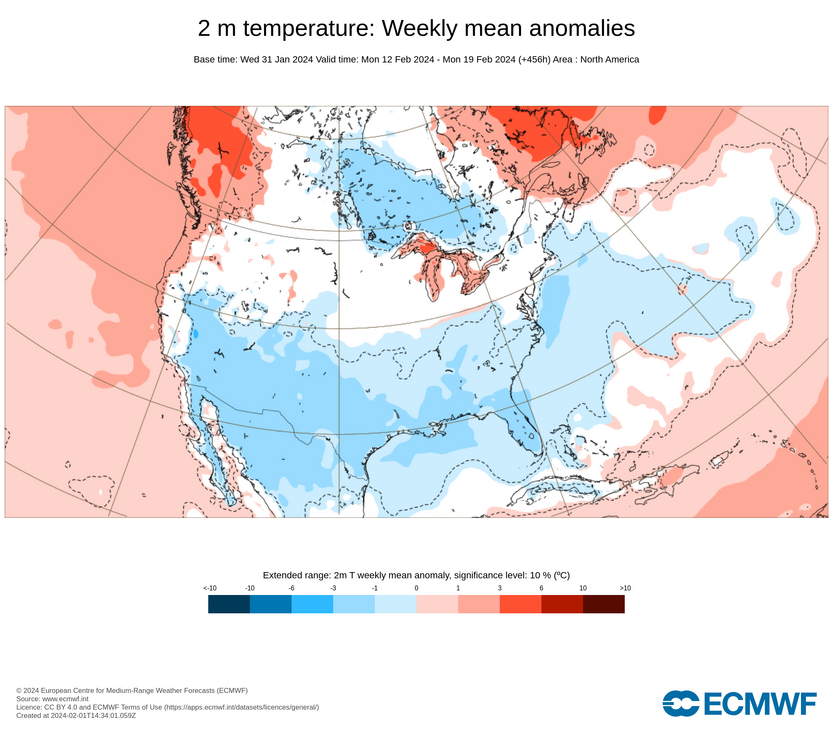-
Posts
22,983 -
Joined
Content Type
Profiles
Blogs
Forums
American Weather
Media Demo
Store
Gallery
Everything posted by donsutherland1
-
At least for now, the 12z GFS is an outlier. The GEFS is colder and the EPS is even more aggressive with the cold. The weeklies continue to show the cold. Moreover, the forecast EPO-/AO-/PNA+ is also consistent with a colder outlook.
-
It should be noted that a national shift does not mean an Eastern U.S. shift. Here are the clusters at 360 hours: I continue to expect that a shift to colder weather will occur in the Northeast near mid-month. The 12z GFS is an outlier at the end of its range and not supported by the GEFS.
-
I didn't mean to suggest that NYC is somehow unique. Overall, snowfall is decreasing in many parts of the world. Some areas, though, have been witnessing rising snowfall as the benefits of added moisture outweigh the impacts of rising temperatures, which still remain sufficiently cold there for long snow seasons. Caribou provides one example. Of course, as warming continues to proceed--and the world remains on a 2.9C path (higher if Hansen is right)--many of those areas will also see a downturn in their seasonal snowfall.
-
There can be year-to-year variability. The confirmation of such a change will be seen in the 30-year seasonal snowfall averages. By the mid-2030s, if NYC is at or below 20" on the 30-year averages (which are highly correlated to 30-year winter temperatures), that will be strong evidence of that change.
-
I agree. I believe that NYC is in the early stages of a transition toward a lower snowfall regime due to the warming, not to mention pattern-related changes driven by the warming SSTs/marine heatwaves, warming Arctic, etc. The recent very low snowfall amounts could also have been amplified by an unfavorable cycle.
-
Yes, that is true. Until temperatures reach a certain threshold, the impact of big events on snowfall could outweigh the decline in snowfall from fewer smaller events. I suspect that this dynamic contributed to some extent to the snowy winters in NYC during the 2000s and early 2010s even as winters gradually warmed. It is also contributing to an ongoing increase in Caribou's snowfall. At some point, the rising warmth can't be overcome and seasonal snowfall (average) falls even as big events and big winters remain possible. Washington, DC has reached that point. Philadelphia may be near that point. I expect that NYC will reach that point in the not-too-distant future at the current rate of warming winters.
-
Latitude offers some benefits from proximity to colder air masses. It’s difficult to know whether the recent drop in snowfall is due to the early stages of a transition to a less snowy climate from background warming, a “low snow” cycle from internal variability, or both. I suspect that it is a combination and that seasonal snowfall will decline to near 20” by the mid-2030s. There will still be snowy winters. 2009-10 in Washington, DC with a warmer climate provides an example.
-
This forecast blocking, the consistent ECMWF weekly forecasts, cooling near the end of the forecasting range on the GEFS and EPS, and ENSO climatology all give me confidence in the onset of a cooler pattern near mid-month.
-
Biggest snowfall in NYC following a 60° or above high: February 8, 2017: 62° February 9, 2017: 9.4" of snow
-
Yes. I am encouraged that they are holding steady, if not continuing to improve.
-
Most days will be mild for the season. With the exception of 1 or 2 days, the rest of next week should see above normal temperatures. There may also be 1-2 days that see readings reach the 50s.
-
Showers and possibly a period of light rain is likely tonight. Tomorrow through the weekend should feature dry and mild readings before it turns briefly cooler early next week. The generally mild conditions will likely continue into at least the second week of February with only brief interruptions. No Arctic air is likely to reach the area during this time. The second week of February could see the evolution toward a sustained colder pattern begin late that week. Overall, February will likely wind up warmer than normal even as the second half of the month could see a sustained period of colder weather. Seasonal snowfall in New York City stood at 2.3" at the close of January. There were 19 prior winters that saw less than 3" of snow through January 31st. The mean snowfall for the remainder of the snow season for those winters was 11.4". The median snowfall was 10.4". The highest snowfall was 38.9" in 1914 with a blizzard on March 1-2 bringing 14.5" of snow. The historic figures for all winters are 14.6" and 11.8" respectively. The ENSO Region 1+2 anomaly was +0.7°C and the Region 3.4 anomaly was +1.7°C for the week centered around January 24. For the past six weeks, the ENSO Region 1+2 anomaly has averaged +0.97°C and the ENSO Region 3.4 anomaly has averaged +1.87°C. A basinwide El Niño event is ongoing. The ongoing El Niño event will continue to fade through much of February. The SOI was -29.40 today. The preliminary Arctic Oscillation (AO) was +3.529 today. On January 30 the MJO was in Phase 7 at an amplitude of 2.230 (RMM). The January 29-adjusted amplitude was 2.171 (RMM).
-
I also used statistics beyond El Niño winters to broaden the sample for some of the variables where sample sizes were very low. For single-digits, I checked for single-digit lows from 2/15 or later since 1990. Just 4/24 (17%) of cases saw one such day. Placing weight on the larger frequency of such days (<20% frequency), my guess was that such an outcome is unlikely. It's not zero, but it's sufficiently low for me to argue that it probably won't happen.
-
I'm not sure how the ECMWF arrived at 46 days.
-
Yes, that's correct. Nothing is guaranteed, but the chances of getting to normal would be remote. Things are even worse if we get to the end of February with little or no additional snowfall:
-
That it will turn colder is likely. Some of the other outcomes depend on a range of factors (cross-polar flow, shortwaves, blocking, synoptic pattern/details, etc.), leading to greater uncertainty. Thus, they were listed as key uncertainties. Best guess: A 2-3 week period with generally colder than normal temperatures (probably running into the first week in March). No single digits in Central Park, but one or more days with lows in the teens. Several light snow events with perhaps a moderate event (3"-4"), which would wind up being this season's biggest event. No big events of 6" or more. All of this will culminate in a winter that will wind up being warmer than normal (likely including February's having a warm anomaly, in large part, due to the very warm first 10-14 days) and much below normal seasonal snowfall by the conclusion of the snow season. This guess is based on the combination of the guidance and statistical outcomes. It should be noted that 46-day maps or 46-day charts have very little skill overall in terms of specifics. Indeed, if they did, the NYC area wouldn't be looking at the distinct possibility of seeing an unprecedented second consecutive season with less than 10" snowfall. I think we'll avoid that outcome, but should February wind up less snowy than I'm thinking, then my thinking on that matter will likely be wrong.
-
There's a table that shows mean/median/highest snowfall for the remainder of the snow season if NYC has less than 3", less than 6", less than 10", or 10" or more snow through February 15th.
-
Near Mid-February Pattern Change: Even as generally warmer than normal weather will continue into at least the second week of this month, the idea that there will be a transition toward a sustained colder pattern beginning late in the second week of the month as mid-month approaches +/- a few days remains largely on track. Confidence in the idea is above average despite lower model/ensemble skill at that forecasting range for several reasons: Consistent signal on the ECMWF weeklies Outcomes consistent with AO-/PNA+ patterns during February 10-20 Historic strong El Niño climatology for February that favors colder weather before and around mid-month (existence of a cold period) ECMWF Weekly Forecast (February 12-19, 2024): AO-/PNA+ Outcomes: Sample sizes: AO-/PNA+: 119 days, All Other Cases: 255 days The timing would be somewhat later than is typical for strong El Niño winters. Such winters typically see their coldest February temperatures just before mid-month. Late in the month, readings warm up. If historic climatology provides some insight into the upcoming pattern evolution, the colder pattern could persist into the first week of March given the timing of its onset. Snowfall: Although snowfall details remain uncertain given the variables involved, should snowfall remain lower or much lower than normal as the month advances, the probability of much below normal seasonal snowfall for Winter 2023-2024 as a whole would increase. Below to much below normal seasonal snowfall from February 1-April 30 is more likely than not given historic experience with winters that have featured the kind of warmth and lack of snowfall seen through January 31st. Key Uncertainties: Whether there would be severe cold with low temperatures falling to the single digits on one or more days. Frequency and amount of snowfall. Whether there would be any significant (6" or above) snowstorms. Duration and magnitude of the cold period.
-
Winter 1895-96 had an even 3" at the end of January. I looked at cases with below 3".
-
Quantum computing should dramatically expand the kind of problems that can be addressed by computers.
-
The final numbers were Boise: 66 and International Falls: 53.
-
January is concluding with a monthly mean temperature of 37.0° in New York City. That is 3.3° above normal. The December 1-January 31 mean temperature will be 40.8°, which ranks 5th highest on record. With the exception of Winter 1931-32, all of the five warmest December-January periods have occurred since 2000. Records go back to 1869. Clouds could persist through much of tomorrow. It will turn milder with readings returning to the middle and upper 40s across the region. Philadelphia and southward could see the thermometer reach or exceed 50°. Showers and possibly a period of light rain is likely late tomorrow and tomorrow night. Friday through the weekend should feature dry and mild readings. The generally mild conditions will likely continue into at least the second week of February with only brief interruptions. No Arctic air is likely to reach the area during this time. The second week of February could see the evolution toward a sustained colder pattern begin late that week. Overall, February will likely wind up warmer than normal even as the second half of the month could see a sustained period of colder weather. Seasonal snowfall in New York City stood at 2.3" at the close of January. There were 19 prior winters that saw less than 3" of snow through January 31st. The mean snowfall for the remainder of the snow season for those winters was 11.4". The median snowfall was 10.4". The highest snowfall was 38.9" in 1914 with a blizzard on March 1-2 bringing 14.5" of snow. The historic figures for all winters are 14.6" and 11.8" respectively. The ENSO Region 1+2 anomaly was +0.7°C and the Region 3.4 anomaly was +1.7°C for the week centered around January 24. For the past six weeks, the ENSO Region 1+2 anomaly has averaged +0.97°C and the ENSO Region 3.4 anomaly has averaged +1.87°C. A basinwide El Niño event is ongoing. The ongoing El Niño event will continue to fade through much of February. The SOI was -21.52 today. The preliminary Arctic Oscillation (AO) was +3.079 today. On January 29 the MJO was in Phase 7 at an amplitude of 2.171 (RMM). The January 28-adjusted amplitude was 2.393 (RMM).
-
Yes, modification and refinement are likely. It's disappointing how painfully slow progress has been on development of a theory of quantum gravity, but the challenge is a very difficult one. Hopefully, advancing AI will be able to assist in that effort in the not too distant future.




